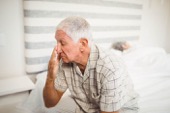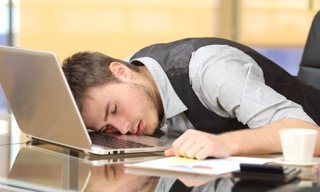Get a Good Night’s Sleep. By Our September Student Pharmacist, Chris Santos.
Can you remember the last time you had a great night of sleep?
If you can’t, you are not alone.
The Centers for Disease Control and Prevention (CDC) states, from a 2016 study, that more than a third of American adults are not getting enough sleep. A lack of sleep is associated with increasing your risk for obesity, diabetes, high blood pressure, stroke, and frequent mental distress. Insufficient sleep is linked to depression, suicide, and risk-taking behaviors.
The American Academy of Sleep Medicine recommends sleeping for these hours considering your age:
Insomnia is a medical condition described as unsatisfactory sleep that impacts daytime functioning AND causes difficulty initiating or maintaining sleep. Insomnia can be caused by medical disorders, medications, work shifts, life stressors, anxiety, and poor sleeping habits.
Before considering over-the-counter (OTC) medications to help improve your sleep insomnia, we recommend improving sleeping habits and sleep hygiene first.
Improve sleep hygiene:
- Keep a routine of sleep/wake times.
- Create a good sleep environment (cool, dark, quiet bedroom with good bedding and, sadly, no pets–which is very hard for some people to limit their pets’ access to the bed).
- Stop caffeine, nicotine, and alcohol in the evening.
- Exercise within 2-3 hours before bedtime.
- Adjust eating and drinking times.
Sleep habits:
- We recommend leaving the bedroom to engage in quiet activities and returning when sleepy. If you cannot to fall asleep within 15-20 minutes of going to bed, get back up and don’t force yourself to try to fall asleep.
- It is a good idea to avoid electronic device usage one hour before your planned bedtime and limit the bedroom for sleep only.
Over-the-counter options for treating insomnia include diphendydramine, doxylamine, and melatonin.
Diphenhydramine:
- Indicated: for individuals 12 years and older (unless directed by your physician).
- Offers relief of occasional sleeplessness.
- Dosing: 50 mg of capsule, tablet, or liquid form once daily before bed.
- Side effects: dry mouth, nose, eyes, as well as blurry vision, urinary hesitancy, and constipation.
- Not recommend: Age >65, see your primary care physician.
We recommend diphenhydramine to be limited to no more than a 10-day use (unless directed by your primary care physician). Try diphenhydramine for 2-3 days, than take one night “off” to see if the symptoms have resolved.
Doxylamine:
- Indicated: for individuals 12 years and older (unless directed by your physician).
- Offers relief of occasional sleeplessness.
- Dosing: 25mg once daily 30 minutes before bed.
- Side effects: dry mouth, nose, eyes, as well as blurry vision, urinary hesitancy, and constipation.
- Not recommended: Age>65, see your primary care physician.
We recommend doxylamine to be limited to no more than a 10-day use (unless directed by your primary care physician). Try doxylamine for 2-3 days, than take one night “off” to see if the symptoms resolved.
Use caution with combination products labeled “PM,” as these most likely contain diphenhydramine or doxylamine.
Melatonin:
- Indicated: for individuals 12 years and older (unless directed by your physician).
- Offers relief of occasional sleeplessness.
- Dosing: 3-5 mg given 3 to 4 hours before bedtime.
- Side effects: fatigue, dizziness, headache, irritability.
Melatonin is also approved for jet lag—a sleeping disorder caused by traveling between multiple time zones quickly.
Skip over-the-counter self-treatment options and see a primary care physician if you are experiencing:
- Chronic insomnia (defined as greater than three weeks).
- Frequent nocturnal awakenings.
- Insomnia due to psychiatric or medical disorders.
- No improvement or continued symptoms after ten days of self-care.
References:
http://techland.time.com/2011/03/07/need-a-good-nights-sleep-turn-off-your-devices/
https://www.cdc.gov/media/releases/2016/p0215-enough-sleep.html
http://www.sleephealthjournal.org/article/S2352-7218%2815%2900015-7/fulltext
https://www.nhlbi.nih.gov/health/health-topics/topics/sdd/why
image: https://www.cbsnews.com/news/cant-sleep-cognitive-behavior-therapy-may-help-insomnia/
image: https://www.helpguide.org/home-pages/sleep.htm
image: https://www.helpguide.org/home-pages/sleep.htm





